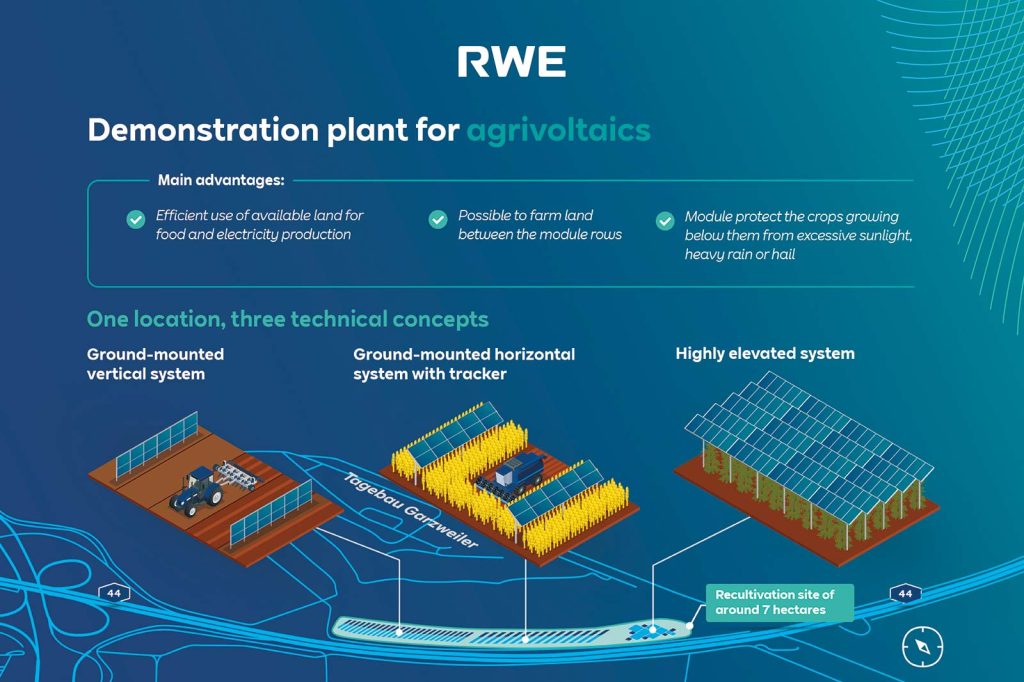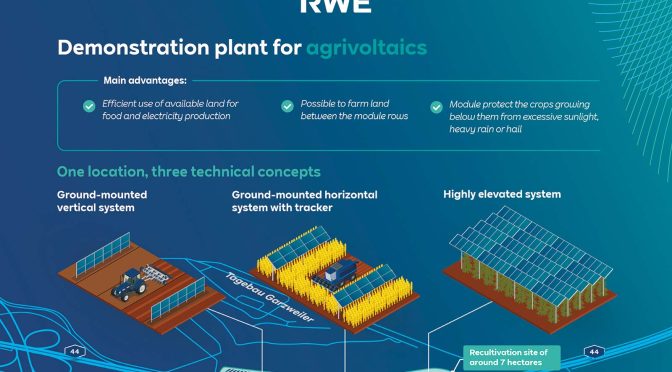Solar power and agriculture in one field – RWE and Forschungszentrum Jülich want to demonstrate how this can work in a demonstration plant in the Rhenish mining district. Earlier today RWE officially launched the project in the presence of Frank Rock, Rhine-Erft County Commissioner, Sascha Solbach, Mayor of the City of Bedburg, and Prof Ulrich Schurr, Director of the Institute for Plant Sciences at Forschungszentrum Jülich.
RWE started construction of the agrivoltaics (Agri-PV) plant for generating solar power while simultaneously using the land for agricultural and horticultural purposes on about seven hectares of recultivated land at the edge of the Garzweiler opencast lignite mine. The research project is funded by the state of North Rhine-Westphalia through the progres.nrw programme for climate protection and the energy transition. The demonstration plant will have a peak capacity of 3.2 megawatts (the equivalent of around 2.5 MWac) and is to be commissioned by the end of this year. At the start of 2024, research activities lasting at least five years are to begin.
The project is aimed at testing suitable cultivation methods and value-adding strategies for operators of Agri-PV plants. Forschungszentrum Jülich contributes its scientific expertise in combining plant research and photovoltaics – including within the context of the bioeconomy. In addition to recultivated land, RWE has long-standing connections with regional farmers and is providing the extensive technical expertise it has gained from the development, construction and operation of solar plants worldwide.
One location, three technical concepts
Three different technical Agri-PV concepts are planned for the demonstration plant, all allowing the simultaneous use of the land for electricity generation as well as agricultural and horticultural production. The first system by Next2Sun uses a vertical design with the solar modules installed rigidly on the substructure. Enough space is left for harvesting machinery between the module rows allowing for the agricultural use of the land to be tested. In the second system by Schletter the modules are installed in rows as well, but they are mounted on a movable axis and follow the course of the sun from east to west.
This should optimise energy yields from the PV system and leave land available for simultaneous agricultural use. In the third system by Zimmermann PV-Stahlbau the PV modules are elevated on a high pergola-like substructure allowing for crops such as raspberries or blueberries to be cultivated below them.

Frank Rock, Rhine-Erft County Commissioner: “Agri PV systems are a combination of agriculture and photovoltaics, thus combining two historical strengths of the Rhine-Erft region: agriculture and energy production. This allows farmers to continue to cultivate their farmland, while at the same time generating electricity from renewable energies. For the energy transition to succeed, more creative approaches like this are needed to make the most efficient use of the limited resources on these sites, while still conserving the environment.”
Sascha Solbach, Mayor of the City of Bedburg: “We are pursuing climate protection and energy transition targets at multiple levels here in Bedburg. Therefore, I am delighted that we are continuing our successful collaboration with RWE in the construction of these Agri-PV systems. The plant is another milestone on the path towards a sustainable electricity supply allowing for the land to be used simultaneously for agricultural purposes. This is particularly important in a region like ours, with a strong agricultural tradition and can make Bedburg the vanguard for similar projects elsewhere.”
Katja Wünschel, CEO RWE Renewables Europe & Australia: “Land is a scarce resource. We must use it responsibly and efficiently. With the large number of sites needed for the expansion of solar energy systems, synergies like those in Agri-PV are extremely valuable. This concept makes it possible to bring in two different yields from the same land – solar power and agricultural produce. With our demonstration plant in Bedburg we are providing important application research enabling us to utilise the full potential of this technology in the future. In this project we are focusing on suitable crops, optimising the design of the PV systems used and concepts for collaborating with the farmers.”
Prof Ulrich Schurr, Director of the Institute for Plant Sciences at Forschungszentrum Jülich and founder of the BioökonomieREVIER initiative: “Agri-PV holds enormous potential for the energy transition in Germany and the Rhenish mining district. In the demonstration plant we can now use land for generating energy and growing agricultural crops simultaneously. The solar modules can even benefit the plants – by protecting them from too much sunlight, hailstorms or frost and by controlling crop irrigation. In this way crop failures can be prevented and yields can even be increased. RWE’s demonstration plant enables us to test innovative technologies that are particularly relevant for agriculture in the Rhenish mining district and extends the approach from the research facility in Morschenich- Alt on land use with practical relevance.”


